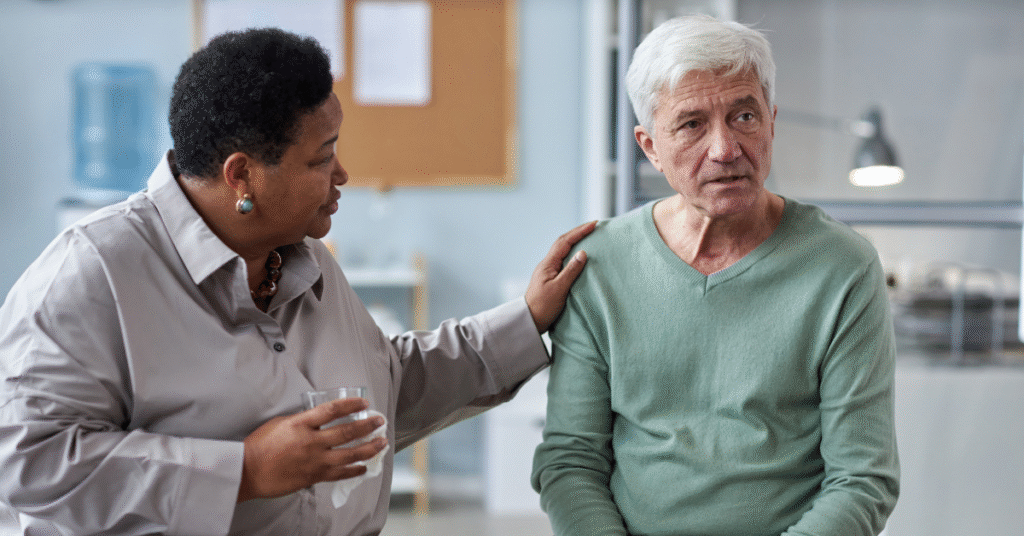The Role of Mental Health in Senior Care: Signs to Watch For

As our loved ones age, we often monitor their physical health closely—but mental health in senior care deserves just as much attention. At Ravenna Assisted Living, we deeply believe in caring for the whole person—mind, body, and spirit. Focusing on mental health helps seniors maintain their independence, emotional balance, and a meaningful quality of life.
Why Mental Health Matters in Senior Years
Mental well-being affects more than a senior’s mood—it impacts cognitive function, physical health, social connections, and even longevity. The National Institute of Mental Health notes that noticeable changes in mood, energy, appetite, sleep, or signs of anxiety and depression should not be ignored.
Key Warning Signs to Be Alert To
Families and caregivers should watch for:
- Persistent sadness, hopelessness, or apathy lasting more than two weeks.
- Significant changes in sleep or appetite, or unexplained aches and pains that might mask emotional distress.
- Withdrawal from friends, hobbies, or community—social isolation is a major red flag for depression in older adults.
- Confusion, difficulty concentrating, or sudden forgetfulness—especially when coupled with mood changes—may signal pseudodementia or underlying mental health issues.
- Uncharacteristic irritability, restlessness, or concerns more serious than mere forgetfulness.
What You Can Do: Proactive Steps for Families and Caregivers
- Start gentle conversations—address observations with compassion. “I’ve noticed you seem more tired—and less interested in painting. How have you been feeling?”
- Stay socially connected. Short, regular visits—phone calls, shared meals, simple activities—can significantly reduce loneliness.
- Encourage medical evaluation. Many mental health issues can look like physical ailments or “normal aging.” Having a physician rule out medical causes is critical.
- Explore therapy and counseling, including community-based options tailored to older adults.
- Adopt lifestyle strategies that support mental well-being: gentle exercise, balanced nutrition, regular sleep, spiritual or creative pursuits.
How Assisted Living Communities Can Help
At Ravenna, mental health is woven into daily life:
- Routine assessments let trained staff notice changes early.
- Group activities and meaningful engagement help prevent isolation and maintain purpose.
- On-site mental health support includes social work services, therapeutic programming, and close coordination with external providers.
- Family education on warning signs, supportive communication, and navigating mental health care in aging.
Trusted Resources for Families & Caregivers
For more information and support, these resources are invaluable:
- National Institute of Mental Health – Older Adults & Mental Health: Covers signs of mental disorders in aging and how to seek help.
- National Institute on Aging – Depression and Older Adults: Clear signs, risk factors, and why it’s often misunderstood as normal aging.
- SAMHSA – Substance Abuse and Mental Health Services Administration: National directory of behavioral health support services (including the 988 crisis helpline).
Final Thoughts
Mental health isn’t an extra—it’s essential. Early awareness, open communication, and compassionate care create a foundation for emotional resilience and dignity as our loved ones age. Helping seniors stay socially engaged, recognized, and supported enriches their lives—and ours.If you notice concerning signs or simply want to learn more, the team at Ravenna Assisted Living is always here to help. Let’s give our seniors the full, empathetic care they deserve—every step of the way.
If you’re concerned about a loved one’s well-being or simply exploring supportive options, we invite you to see the Ravenna difference for yourself. Call us at (505) 831-4141 to schedule a personalized tour and learn how we prioritize mental health in senior care. You can also easily book a tour using the button at the top of this page. Let’s work together to create a compassionate, engaging, and healthy environment for the next chapter of life.
